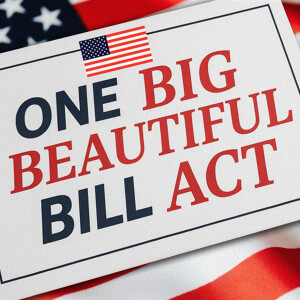
In this episode, Angela discusses the "One Big Beautiful Bill Act" and its implications for individuals, business owners, farmers, and ranchers. She provides an overview of the bill, focusing on key aspects such as permanence and stability in the tax code, student and child-focused provisions, charitable gifting, state and local taxes, and new tax legislation.
Key Takeaways 💡
- The extension and expansion of the 2017 Tax Cuts and Jobs Act brings permanence to several provisions, preventing taxes from reverting to 2016 rates and rules, which includes the alternative minimum tax (AMT). This stability allows families and business owners to make informed decisions about their financial future without the uncertainty of fluctuating tax laws.
- The estate tax exemption is set at $15 million per person, adjusted for inflation, providing a stable foundation for estate planning. This permanency helps small business owners, farmers, and ranchers plan their estates with more certainty, although significant inflation may still require additional planning for larger estates.
- The Section 199A business owner deduction, which allows a 20% deduction on business income for pass-through entities, has been extended and expanded. This extension includes higher income phase-in amounts and a minimum deduction, offering significant benefits to small business owners by reducing their taxable income.
- Businesses can once again depreciate 100% of assets placed in service after January 19th, 2025, regaining the first-year bonus depreciation. Additionally, the ability to expense depreciation on equipment has increased to $2.5 million, up from $1.25 million, providing valuable tax benefits for business investments.
- Opportunity Zones have been made permanent, offering a rolling five-year deferral of capital gains for investments in designated areas. Investing in rural Opportunity Zones may qualify for a 30% basis increase, enhancing the tax benefits and incentivizing investment in these areas.
- Businesses that utilized the Employee Retention Credit (ERC) should seek counsel to ensure compliance, as the audit time has been extended, clawbacks are being enforced, and penalties have been elevated. The IRS is scrutinizing ERC claims, and businesses need to verify their eligibility and documentation to avoid potential issues.
- Several electric vehicle and clean energy credits are set to expire soon, including credits for commercial clean vehicles, new clean vehicles, and previously owned clean vehicles. To take advantage of these credits, purchases must be made before September 30th for electric vehicles and December 31st for solar, wind, and home energy improvements.
- The cap on the federal deduction for state and local taxes (SALT) has been temporarily increased to $40,000, but it begins to phase out with $500,000 of income and reverts back to $10,000 in 2030. However, the pass-through entity workaround, which allows deducting property expenses within a pass-through entity, remains a viable strategy to regain missing state and local tax deductions.
Version: 20241125
No comments yet. Be the first to say something!